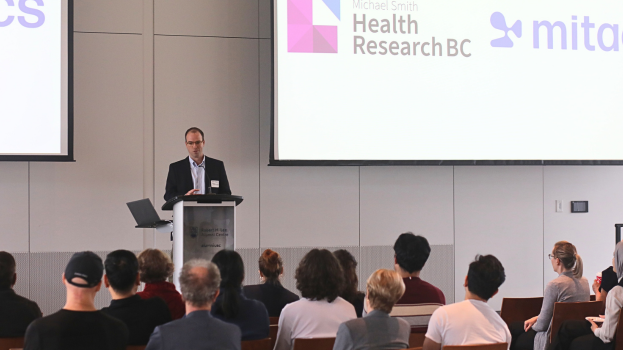Breaking the stigma of dementia one conversation at a time
17 March 2025

Photo: Dr. Juanita-Dawne Bacsu (third from the left) at the Population Health and Aging Rural Research (PHARR) Centre’s Rural Aging and Stigma of Dementia Workshop, with other attendees and experts in the field.
Credit: PHARR Centre
| Despite affecting millions worldwide, dementia still carries a lot of stigma and misunderstanding. Fear and misinformation can stop people living with dementia and their care partners from seeking help. This in turn can impact mental health, social connections and quality of life.
Dr. Juanita-Dawne Bacsu is on a mission to change that. Based at Thompson Rivers University in Kamloops, she recently led an initiative to raise dementia awareness and education in rural communities. Her work aims to reduce stigma and improve quality of life. “Dementia kept coming up in interviews with rural older adults — issues of stigma, fear, lack of knowledge and misdiagnosis,” she says. “It became clear that addressing dementia stigma, such as negative judgment and assumptions, was critical to reducing barriers to care and improving quality of life.” We caught up with Juanita-Dawne to learn more about her work. |
Dr. Juanita-Dawne BacsuHealth Research BC supports Dr. Juanita-Dawne Bacsu through a 2023 Convening and Collaborating Award and 2024 Reach Award related to addressing the stigma of dementia. These awards are co-funded in partnership with Alzheimer’s Society of BC. |
Q: Why is the stigma of dementia such a critical issue, especially in rural communities?
Older adults in rural communities often struggle to get the dementia care they need. Limited access to public transportation, information, healthcare and support services makes it even harder. Dementia risk increases with age; rural older adults are especially vulnerable. But many cases go undiagnosed. Lack of knowledge, stigma and fear keep people from seeking help. Many also mistakenly believe that dementia is just a normal part of aging. As a result, dementia often becomes a taboo topic, much like mental health once was.
While there’s a lot of research on dementia stigma, there’s not enough focus on actionable strategies to address it. Through rural community partnerships, my research prioritizes lived experiences to identify meaningful actions that can reduce stigma and support those affected.
Q: You collaborated with a community advisory team to develop a research agenda for addressing dementia stigma in rural communities across BC’s Interior. How did you approach this work?
Over 70 people attended our workshop in Kamloops, including health professionals, policymakers, people living with dementia, care partners, students and researchers.
The workshop showed just how powerful collaboration can be. Through discussions and activities like poster presentations and a world café session, we found common ground on what needed to change. It was inspiring to see everyone come together, focused on one mission: ending stigma and addressing the needs of rural people living with dementia and their care partners.
Credit: PHARR Centre
Q: Why was it necessary to include research users, including people with lived experience, in your work?
I believe every voice matters when it comes to advancing dementia research. By prioritizing lived experience, we can conduct more meaningful and innovative research that truly reflects the needs of those impacted. This includes rural people living with dementia and their care partners, whose perspectives are essential in shaping effective solutions.
Q: Based on your findings, what key actions are needed to break dementia stigma?
Education is a critical one. People need ways to learn about dementia at every stage of life — whether it’s through workshops, webinars or even podcasts that share real stories. Hearing directly from those living with dementia can break myths and shift perspectives.
Community support matters, too. Rural communities thrive on informal support networks. Creating neighbourhood groups and forums helps people connect and share resources.
Finally, care needs to be personalized and culturally relevant. Every community is different, so understanding cultural needs and tailoring support is key. Improving access to dementia diagnosis and offering support services that fits each person’s needs are crucial. One size doesn’t fit all.
Q: What’s next for you and your research?
I’m committed to amplifying the voices of rural people with dementia and their care partners. In 2024, I received a Reach award, co-funded by Health Research BC and the Alzheimer’s Society of BC, to expand this work. My latest project tackles dementia stigma on social media, where misinformation and stereotypes often spread. By working with community partners, I hope to change the conversation, raise awareness and develop solutions that improve quality of life.
I understand that addressing stigma requires collaboration—at the individual, community and policy levels. I believe that changing how we talk about dementia can shift perceptions and help policymakers, health professionals and the public recognize the full value of people living with dementia.
“There’s so much work to be done, but through collaborative research and education, we can break down barriers and create real change to address stigma of dementia.”
To learn more about Juanita-Dawne’s work, check out the workshop video, read the final report or visit the Population Health and Aging Rural Research Centre website.
Stay informed
Learn more about our funding programs.
Stay tuned for more exciting stories that highlight impacts being made across BC. Subscribe to our newsletter and follow us on LinkedIn.
| Dr. Juanita-Dawne Bacsu is a Canada Research Chair (CRC) Tier II in Nursing and Population Health and an Assistant Professor in the School of Nursing at Thompson Rivers University. Drawing on a social determinants of health approach, Juanita-Dawne’s CRC focuses on supporting the health equity of older adults living with dementia in rural communities. Her research interests include rural health, gerontology, stigma, dementia, cognitive health promotion, infodemiology, and health policy.
Supported by a Health Research BC 2023 Convening and Collaborating Award and a 2024 Reach Award, both co-funded with Alzheimer’s Society of BC, Juanita-Dawne is addressing the stigma of dementia in rural communities. “The funding has been instrumental,” says Juanita-Dawne. “It empowers me to transform ideas into evidence-based research to help the community. This funding enables me to build community partnerships and a strong foundation to prioritize actions to address this complex issue.” |






